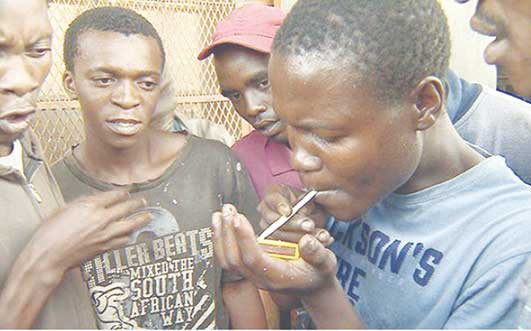
POOR budgetary allocations to the Health ministry, inadequate drug laws and a shortage of public health specialists are stalling Zimbabwe’s fight against rising drug and substance abuse, a recent report has indicated.
The research by Accountability Lab Zimbabwe (ALZ) noted that the scourge can be contained if governmental built adequate rehabilitation facilities and strengthened or upgraded existing laws on drug and substance abuse.
“Public health specialists’ recruitment and retention remain limited. There are capacity gaps in mental health treatment facilities, which can undermine the potential for treatment facilities to transform into treatment centres that are rights responsive.
“Existing legislation on drugs and substance abuse in Zimbabwe does not adequately address challenges related to drugs and substance abuse. Zimbabwean drug laws do not adequately address issues surrounding drug use or misuse, particularly concerning prevention and treatment. The Dangerous Drugs Act [Chapter 15:02] and the Criminal Law (Codification and Reform) Act [Chapter 9:23] have not stayed up to date with the current thinking on ways of mitigating drug and substance abuse. Similar sentiments are shared in the National Strategic Plan on Mental Health Services (2019-2023),” ALZ said.
“Legislators should consider prioritising the review and strengthening of the Dangerous Drugs Act [Chapter 15:02] and the Criminal Law (Codification and Reform) Act [Chapter 9:23] in line with international standards and conventions by ensuring that legislation is human centred, even for those arrested. This should include more recent drugs such as methamphetamine (guka/mutoriro or dombo.”
The Health and Child Care ministry estimates that current mental health facilities can only cater for roughly 5 000 patients at a given time, amid rising drug and substance abuse cases which have triggered a surge in mental health patients.
ALZ recorded a clinical psychologists density is 0,04 per 100 000 population and a psychiatrists density of 0,1 per 100 000 population.
The non-governmental organisation has urged increased public awareness campaigns about the scourge.
- Calls for drug laws reform grow louder
- Need for transparency on The fears of the Hlengwe-Xangani ethnic group commonly referred to as the Chilonga community are not unfounded issue
- Hesitancy slows Covid vaccination for children
- Zimbabwe’s proposed draconian law will curtail election observation
Keep Reading
“Public awareness will increase both citizens’ and stakeholders’ enthusiasm and support, stimulating agency (individual and collective), action and mobilisation of resources. Ensuring that the public is kept abreast of government plans and progress in curbing drug and substance abuse, as well as constructing more treatment facilities and training and recruiting staff will be a fundamental step forward in initiating a public health informed response to this issue.
“The government should also provide publicly accessible information on its progress in meeting the goals set out in the Treatment and Rehabilitation Guidelines of Alcohol and Substance Use Disorder of Zimbabwe. This information should also include progress reports on the construction of recreational facilities and how the government is addressing problems related to the adequate staffing and training of specialist mental health professionals.
“In conjunction with ongoing efforts to publicly acknowledge the gravity of drug and substance abuse in Zimbabwe, the President should formalise the declaration of a national state of disaster in terms of section 27 (2) of the Civil Protection Act [Chapter 10:06]. This is an executive order that will activate the disaster response and recovery mechanisms of the State putting into motion emergency operations that will galvanize both the state and non-State actors to allocate resources and mobilise efforts towards addressing the national scourge,” ALZ added.
Civil society organisations have also been urged to facilitate providing psychosocial support assisting those struggling with substance abuse, encouraging treatment uptake and referrals to rehabilitation and/or treatment centres and training community social workers and community support groups in ethical psychotherapy.
Meanwhile, in a bid to tackle the rise in drug and substance abuse, China has donated antinarcotics laboratory equipment to the Home Affairs ministry worth US$136 988.
The laboratory equipment included a Raman spectrometer and drug extraction and sampling kits, which detect narcotics in a matter of seconds.









